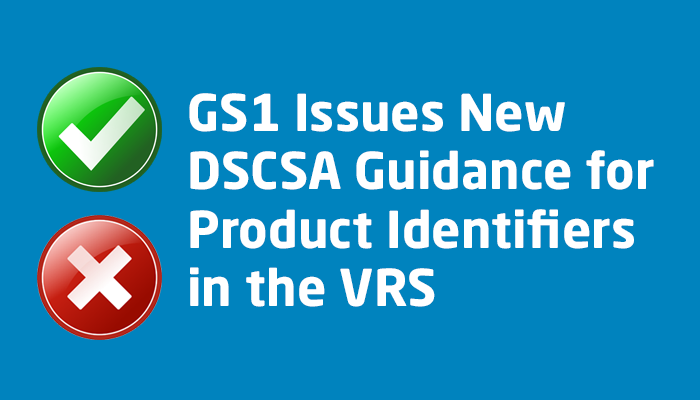On March 31, GS1 released new guidance concerning product identifiers (PIs) in the DSCSA Saleable Returns Verification Requirement. The 60-page document describes different scenarios for how pharma supply chain stakeholders can treat the PI status of a returned serialized product in the Verification Router Service (VRS).
Let’s take a look at what new GS1 guidance says about dealing with PIs.
The Basics of the DSCSA Saleable Returns Verification Requirement
The DSCSA Saleable Returns Verification Requirement says that wholesale distributors must verify the PIs on sealed homogeneous cases or packages before they can resell a returned product. This went into effect on November 27, 2019. However, as we reported last September, the FDA delayed enforcement by one year to allow additional time for industry readiness.
The PI contains a Global Trade Item Number (GTIN), a serial number, a lot ID, and an expiration date (for the lot).
In a nutshell, the VRS has requestors and responders. A requestor, often a wholesale distributor, sends a verification request to a responder, usually a manufacturer. The VRS routes the request to the appropriate responder for verification of the PI against its repository. The responder returns the following values:
-
- Response status: Do all four components of the PI match?
- Failure reason: If they don’t match, why?
- Other information about the PI status: This can be used to identify concerns about the product (e.g., if it has been recalled or is suspect).
A strict interpretation of the DSCSA provides a verification “pass” or “fail” based only on matching all four PI elements. In other words, the DSCSA does not require a responder to consider the PI status as part of its verification. However, many manufacturers believe the PI status must be considered. This is why GS1 developed its new guidance for PIs in the DSCSA Saleable Returns Verification Requirement.
What the GS1 Guidance Says
The guidance describes seven scenarios for saleable return responses, summarized below. For full details, contact us and review the GS1 guidance.
SCENARIO A: The PI matches the manufacturer’s repository and there is no information to indicate that the product is unfit for distribution. The product is verified for resale.
SCENARIO B1: The PI matches. However, the manufacturer has reason to believe the product is recalled/withdrawn or expired. The product DOES pass verification for resale (based on the manufacturer’s internal policy) and the manufacturer provides “Recalled” or “Expired” as additional information in the Output Response.
SCENARIO B2: Same as B1, but the product DOES NOT pass verification for resale (based on the manufacturer’s internal policy) and the manufacturer provides “Recalled” or “Expired” as additional information in the Output Response.
SCENARIO C1: The PI matches, but the manufacturer has reason to believe the product is suspect. The product DOES NOT pass verification for resale and the manufacturer provides “Not_for_re-distribution” as a reason for the failure with “Suspect” as additional information in the Output Response.
SCENARIO C2: The PI matches, but the manufacturer has reason to believe the product is unfit for distribution. The product DOES NOT pass verification for resale and the manufacturer provides “Manufacturer_policy” as a reason for the failure without additional information in the Output Response.
SCENARIO D: The PI DOES NOT match. The product DOES NOT pass verification for resale and the manufacturer provides “No_reason_provided” as a reason for the failure.
SCENARIO E: The PI DOES NOT match. The product DOES NOT pass verification for resale. In addition to “No_reason_provided,” there are four other possible reasons the manufacturer can give for the PI mismatch in the Output Response:
-
- “No_match_GTIN_Serial”
- “No_match_GTIN_Serial_Lot_Expiry”
- “No_match_GTIN_Serial_Lot”
- “No_match_GTIN_Serial_Expiry”
Final thoughts
As of May 6, 2020, rfxcel is the only VRS provider to comply with the updated GS1 specifications and fully support all of its scenarios and response options. We also implemented the FDA’s VRS pilot. When you work with us, you’ll know you’re working with the industry’s foremost authority on VRS and the DSCSA Saleable Returns Verification Requirement.
Contact us today to speak with one of our supply chain experts. We can help you understand the intricacies of VRS and the DSCSA, how they might affect your business, and how to be fully prepared for compliance now and always.





